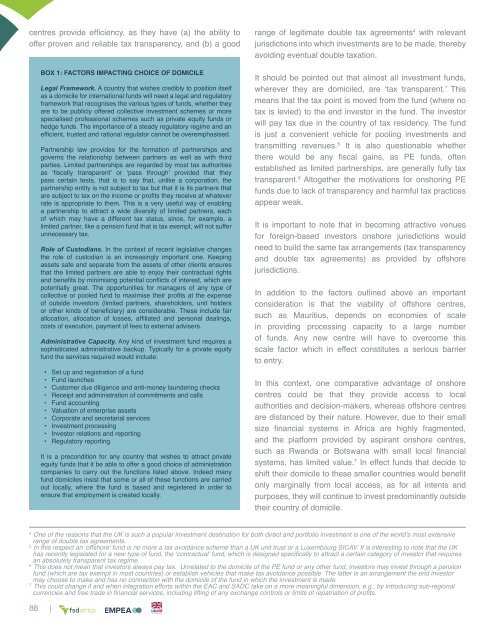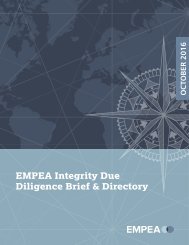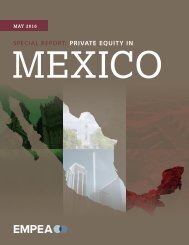Create successful ePaper yourself
Turn your PDF publications into a flip-book with our unique Google optimized e-Paper software.
centres provide efficiency, as they have (a) the ability to<br />
<strong>of</strong>fer proven and reliable tax transparency, and (b) a good<br />
BOX 1: FACTORS IMPACTING CHOICE OF DOMICILE<br />
Legal Framework. A country that wishes credibly to position itself<br />
as a domicile for international funds will need a legal and regulatory<br />
framework that recognises the various types <strong>of</strong> funds, whether they<br />
are to be publicly <strong>of</strong>fered collective investment schemes or more<br />
specialised pr<strong>of</strong>essional schemes such as private equity funds or<br />
hedge funds. The importance <strong>of</strong> a steady regulatory regime and an<br />
efficient, trusted and rational regulator cannot be overemphasised.<br />
Partnership law provides for the formation <strong>of</strong> partnerships and<br />
governs the relationship between partners as well as with third<br />
parties. Limited partnerships are regarded by most tax authorities<br />
as ‘fiscally transparent’ or ‘pass through’ provided that they<br />
pass certain tests, that is to say that, unlike a corporation, the<br />
partnership entity is not subject to tax but that it is its partners that<br />
are subject to tax on the income or pr<strong>of</strong>its they receive at whatever<br />
rate is appropriate to them. This is a very useful way <strong>of</strong> enabling<br />
a partnership to attract a wide diversity <strong>of</strong> limited partners, each<br />
<strong>of</strong> which may have a different tax status, since, for example, a<br />
limited partner, like a pension fund that is tax exempt, will not suffer<br />
unnecessary tax.<br />
Role <strong>of</strong> Custodians. In the context <strong>of</strong> recent legislative changes<br />
the role <strong>of</strong> custodian is an increasingly important one. Keeping<br />
assets safe and separate from the assets <strong>of</strong> other clients ensures<br />
that the limited partners are able to enjoy their contractual rights<br />
and benefits by minimising potential conflicts <strong>of</strong> interest, which are<br />
potentially great. The opportunities for managers <strong>of</strong> any type <strong>of</strong><br />
collective or pooled fund to maximise their pr<strong>of</strong>its at the expense<br />
<strong>of</strong> outside investors (limited partners, shareholders, unit holders<br />
or other kinds <strong>of</strong> beneficiary) are considerable. These include fair<br />
allocation, allocation <strong>of</strong> losses, affiliated and personal dealings,<br />
costs <strong>of</strong> execution, payment <strong>of</strong> fees to external advisers.<br />
Administrative Capacity. Any kind <strong>of</strong> investment fund requires a<br />
sophisticated administrative backup. Typically for a private equity<br />
fund the services required would include:<br />
• Set up and registration <strong>of</strong> a fund<br />
• Fund launches<br />
• Customer due diligence and anti-money laundering checks<br />
• Receipt and administration <strong>of</strong> commitments and calls<br />
• Fund accounting<br />
• Valuation <strong>of</strong> enterprise assets<br />
• Corporate and secretarial services<br />
• Investment processing<br />
• Investor relations and reporting<br />
• Regulatory reporting<br />
It is a precondition for any country that wishes to attract private<br />
equity funds that it be able to <strong>of</strong>fer a good choice <strong>of</strong> administration<br />
companies to carry out the functions listed above. Indeed many<br />
fund domiciles insist that some or all <strong>of</strong> these functions are carried<br />
out locally, where the fund is based and registered in order to<br />
ensure that employment is created locally.<br />
range <strong>of</strong> legitimate double tax agreements 4 with relevant<br />
jurisdictions into which investments are to be made, thereby<br />
avoiding eventual double taxation.<br />
It should be pointed out that almost all investment funds,<br />
wherever they are domiciled, are ‘tax transparent.’ This<br />
means that the tax point is moved from the fund (where no<br />
tax is levied) to the end investor in the fund. The investor<br />
will pay tax due in the country <strong>of</strong> tax residency. The fund<br />
is just a convenient vehicle for pooling investments and<br />
transmitting revenues. 5 It is also questionable whether<br />
there would be any fiscal gains, as PE funds, <strong>of</strong>ten<br />
established as limited partnerships, are generally fully tax<br />
transparent. 6 Altogether the motivations for onshoring PE<br />
funds due to lack <strong>of</strong> transparency and harmful tax practices<br />
appear weak.<br />
It is important to note that in becoming attractive venues<br />
for foreign-based investors onshore jurisdictions would<br />
need to build the same tax arrangements (tax transparency<br />
and double tax agreements) as provided by <strong>of</strong>fshore<br />
jurisdictions.<br />
In addition to the factors outlined above an important<br />
consideration is that the viability <strong>of</strong> <strong>of</strong>fshore centres,<br />
such as Mauritius, depends on economies <strong>of</strong> scale<br />
in providing processing capacity to a large number<br />
<strong>of</strong> funds. Any new centre will have to overcome this<br />
scale factor which in effect constitutes a serious barrier<br />
to entry.<br />
In this context, one comparative advantage <strong>of</strong> onshore<br />
centres could be that they provide access to local<br />
authorities and decision-makers, whereas <strong>of</strong>fshore centres<br />
are distanced by their nature. However, due to their small<br />
size financial systems in Africa are highly fragmented,<br />
and the platform provided by aspirant onshore centres,<br />
such as Rwanda or Botswana with small local financial<br />
systems, has limited value. 7 In effect funds that decide to<br />
shift their domicile to these smaller countries would benefit<br />
only marginally from local access, as for all intents and<br />
purposes, they will continue to invest predominantly outside<br />
their country <strong>of</strong> domicile.<br />
4<br />
One <strong>of</strong> the reasons that the UK is such a popular investment destination for both direct and portfolio investment is one <strong>of</strong> the world’s most extensive<br />
range <strong>of</strong> double tax agreements.<br />
5<br />
In this respect an ‘<strong>of</strong>fshore’ fund is no more a tax avoidance scheme than a UK unit trust or a Luxembourg SICAV. It is interesting to note that the UK<br />
has recently legislated for a new type <strong>of</strong> fund, the ‘contractual’ fund, which is designed specifically to attract a certain category <strong>of</strong> investor that requires<br />
an absolutely transparent tax regime.<br />
6<br />
This does not mean that investors always pay tax. Unrelated to the domicile <strong>of</strong> the PE fund or any other fund, investors may invest through a pension<br />
fund (which are tax exempt in most countries) or establish vehicles that make tax avoidance possible. The latter is an arrangement the end investor<br />
may choose to make and has no connection with the domicile <strong>of</strong> the fund in which the investment is made.<br />
7<br />
This could change if and when integration efforts within the EAC and SADC take on a more meaningful dimension, e.g., by introducing sub-regional<br />
currencies and free trade in financial services, including lifting <strong>of</strong> any exchange controls or limits <strong>of</strong> repatriation <strong>of</strong> pr<strong>of</strong>its.<br />
88 |





